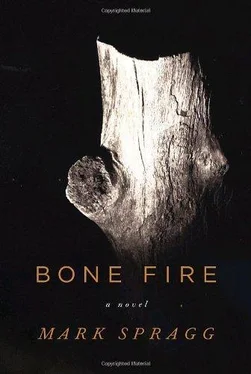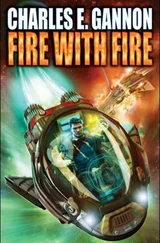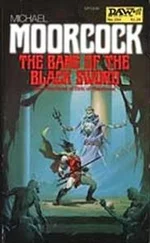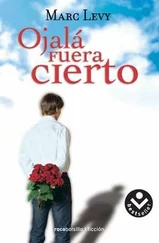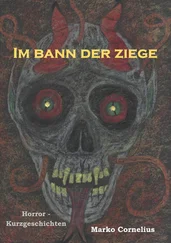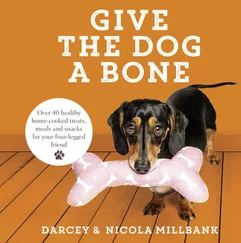She held her hands up in the yellow afternoon light and closed them into fists, dropping them finally onto the table and sitting there quietly, trying to summon the conviction that she would be able to care for him if his mind collapsed completely. Feed, bathe and dress him, reason with him. Keep them both safe from these episodes of sulking infancy.
The door stood propped open and a magpie strutted through the glare of the workyard, stopping at the edge of the studio’s porch with its head cocked and turned, neck feathers ruffed, the black bead of an eye glistening. Then light flashed off the glass of a car turning into the drive, and the bird stepped back and rose into flight.
She untied her utility apron, lifted it over her head and hung it on a hook by the door.
A dog ran to the edge of the yard, cocking a leg up to pee, and when she crossed the porch he came toward her wagging his tail. His chest and legs were white, his body brindled in overlapping swatches of blue merle and liver. She squatted at the hose bib to wash her hands, standing when she heard the car door shut. She shaded her eyes, watching a tall woman in tan shorts and a navy-blue T-shirt approach, stopping to stretch her arms above her head, her curly gray hair cut to match the sharp line of her jaw, and Griff thought, Please, don’t let me fuck this up.
“He’s friendly.” The silver Volvo parked behind her was the same color as her hair.
Griff squatted again at the bib, running her cupped hands full, and the dog stepped forward to lap at the water, watching her, one eye hazel, the other pale blue. When he’d had enough he backed away and sat in the border of dampened earth.
“His eyes are different colors,” Griff said.
“Don’t you wish yours were?”
The woman bent at the waist to drink from the spigot and the dog darted in, snapping at her hair, his back end wiggling as though attached to a separate axis. She pushed him away, laughing, and shut the water off, turning toward the house. She raked her wet hands back through her hair.
“He’s inside,” Griff said.
“In the middle of the day?”
“Yes, ma’am.”
She wiped at her chin with the back of a hand. “What about Mitch? He stay indoors all day too?”
“Mitch died.”
“I’m sorry to hear that.” She moved into the shade the building cast. “Did he go hard?”
“Yes, he did. He suffered a lot.” The woman nodded, asking nothing more, so Griff added, “He died when I was eleven.”
“How old are you now?”
“Nineteen.”
“Can we step in out of this heat?” She was staring up into the hot, pale sky.
“We can go in the house if you want. I made up the guest room for you.”
“I can’t just yet. I’ll let you know when I’m ready.”
“Yes, ma’am.”
She extended her hand. “This is going to work out a lot better if you call me Marin.” She indicated the dog. “His name’s Sammy.”
Griff took her hand. “Everybody calls me Griff.”
“Like your dad?”
She nodded and turned and Marin followed her up onto the porch and into the studio, where Griff turned off the radio.
Marin leaned back against the work island, scuffing a heel against the worn floorboards, rutted and stained in patterns of neat’s-foot, diesel and two-cycle oils, turpentine and creosote. She inhaled deeply. “It still smells like my daddy’s shop.”
“It’s mine now,” Griff said, hating how that sounded, adding that it was Einar who allowed her to use it. “We moved the tools over to the granary,” she said.
Marin picked up one of the ceramic ribs, pressing it against her side as though comparing the size, then placing it back on the worktable. She looked at the raw pieces heaped on the shelving. “Do you mostly make bones?”
Griff stepped to a steel rod held upright in the jaws of a vise at the table’s edge. It was curved gracefully, like a girl’s spine, the five lumbar vertebrae held in place by a variegated and grooved coccyx that was tucked in stiffly, like some docked vestigial tail. “I use the rods and wire to piece them together.”
“You make skeletons, then?”
“Sort of.”
“Are you nervous?”
Griff took her hands out of her front pockets and, not knowing what to do with them, tucked them into her back pockets. “More than I thought.”
Marin smiled. “I knew I would be.” She lifted the pelvis up, sighting out the window through its cradle. “Mitch was a sweetheart. I always hoped he’d get lucky and have something quick like a heart attack.”
“I need you to put that down.”
Marin lowered the curved bone as she might a chalice. “I’m not going to drop it.”
“You might.”
“I guess I might.” She placed it carefully back on the table and Griff stepped forward, squaring it with the arrangement of ribs.
“It took me a long time to get it right,” she said.
They listened to the dog circling and finally settling on the porch.
“How sick is he?”
“I don’t know for sure. He won’t go to the doctor, but Paul doesn’t think he’s going crazy. He thinks it’s something else.”
“Paul’s not a doctor, then?”
“He’s my boyfriend.”
Marin stared vacantly out the window. “I always thought it was sad here. Even when everyone was alive.”
“I like it better than anywhere I’ve ever been.”
Marin turned to her. “You look a lot like I used to. When I was a girl.”
“Thank you.”
“I’m not sure it’s a compliment.”
“I think it is.”
“I’m ready now. Now I think we can go in.”
He’d bathed and dressed in clean clothes and was lying on top of the bedcovers, napping. They came in without trying to be quiet and stared down at him.
“He had a bad night.” Griff stepped back toward the doorway, leaning into a dresser.
Marin remained by the bed. “He comes from a long line of people who’ve had bad nights.” She took his hand and he opened his eyes, blinking up at her. “It’s your sister,” she whispered.
She sat on the edge of the bed, against his hip, and he pulled his hand away, groping at the nightstand until he felt his glasses. When he got them on he thrust his head forward, squinting, and when he still wasn’t satisfied he swung the magnifying glass around. Marin held her face up close to the lens.
“Oh, my,” he said.
He lightly touched her face and hair while he studied her, then folded the glass back against the wall.
“I’ve gotten a little older,” she said.
His eyes appeared bluer to Griff than they had in some time.
“You look just about the same to me. About right, anyway.” He relaxed back against the pillows, holding her hand in both of his. “I’m sorry about your friend.”
“You mean Alice.”
“Yes, that’s it exactly,” he said, “Alice Clark. McEban read about her passing on his Internet. He’s a wizard when he gets up and rolling on his computer. Sells his cows on it. Did you come out on 80?”
“I don’t understand.”
“On that interstate through Nebraska.”
“No, I drove through South Dakota.”
“That’s how I thought you’d come. I told him so.” He looked pleased. “McEban thought 80, but that’s because he likes those sandhills. I believe that prejudiced his thinking. He said if it was him he’d have driven north on the two lanes out of North Platte.” He was speaking rapidly, as though he had a good deal to relate and not much time. “Did you stop and have a look at that Crazy Horse mountain in the Black Hills?”
“I missed it,” she said. “I only stopped for a night, and to call your granddaughter. To tell her I was on my way.”
“I’ve always wanted to get up there to South Dakota and see how they’re coming along with that Crazy Horse sculpture. Sometimes you don’t pay attention to what you’ve got in your own backyard. I’m guilty of that. I mean putting your head down like I have. Just looking for your enjoyment in work. Sometimes I think that might’ve been a mistake.”
Читать дальше
